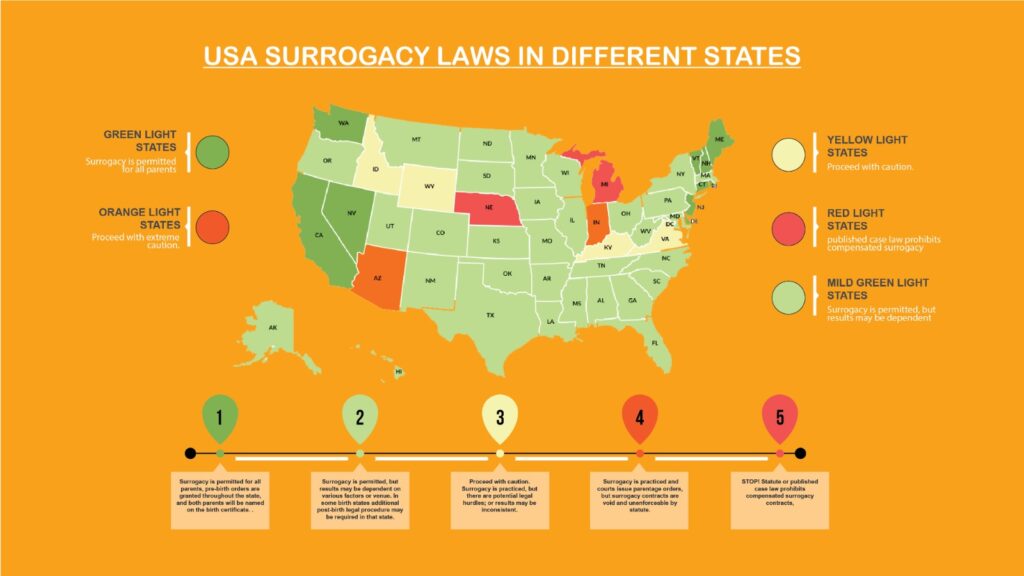Surrogacy Laws in the USA| Surrogacy Laws by State

Understanding Surrogacy Laws by State: A Comprehensive Guide for Surrogacy in the USA
Surrogacy Laws in the USA vary significantly from state to state, making it essential for intended parents and surrogates to fully understand their legal rights and obligations. Understanding surrogacy laws by state is crucial, as some states are more surrogacy-friendly than others, while a few impose restrictions or outright bans. As a trusted surrogacy agency, we provide the most up-to-date legal insights to help you navigate the legal aspects of surrogacy in the USA. In this comprehensive guide, we will outline surrogacy requirements, pre-birth orders, and adoption processes, ensuring you are well-prepared for a legally sound and successful surrogacy journey.
- Book an online appointment: Get a free online consultation.
- Call\W:+91-8800481100 Email:neelam@ivfconceptions.com
Key takeaways:
- Surrogacy laws in the United States vary from state to state, as there are no federal surrogacy laws.
- It is crucial to understand the surrogacy laws in the state where the surrogate resides and will give birth.
- 47 out of the 50 states in the US recognize gestational surrogacy, but Nebraska, Michigan, and Louisiana do not currently recognize it.
- Commercial surrogacy laws differ across states, with some prohibiting compensation for surrogates and others imposing restrictions on reimbursement amounts.
- Surrogacy-friendly states have laws explicitly permitting and acknowledging surrogacy, while non-friendly states do not recognize or uphold surrogacy contracts.
- Gray-area states have ambiguous laws that provide less certainty and protection for both surrogates and intended parents.
- Surrogacy-Friendly States: California, Connecticut, Delaware, District of Columbia, Maine, New Hampshire, Nevada, New York, Oregon, Rhode Island, Washington
- We offer the best surrogacy programs worldwide, contact us to know more.
Additional guide for intended parents:
Best surrogacy agency in India
Best surrogacy agency in Mexico
Best surrogacy agency in Colombia
Best surrogacy agency in Argentina
Best surrogacy agency in Georgia
Best surrogacy agency in the USA
Best surrogacy agency in Ukraine
Best surrogacy agency in Armenia
The Importance of Knowing Surrogacy Laws by State
Before delving into the specifics, it’s essential to emphasize the significance of understanding surrogacy laws in the United States. As there are no federal surrogacy laws, the regulations governing surrogacy are determined at the state level. Consequently, the laws can differ significantly, and complying with them is crucial to avoid potential legal complications.
Consulting with a surrogacy specialist and an experienced surrogacy attorney is paramount, as they will guide you through the intricacies of the surrogacy process while ensuring your legal interests are safeguarded. While the information presented in this article serves as a valuable resource, it should not be construed as legal advice, and we strongly recommend consulting professionals well-versed in local surrogacy laws.

Why is Surrogacy Law in the USA so Confusing?
When it comes to the legal aspects of surrogacy, the landscape becomes intricate and confusing due to the absence of a federal law governing surrogacy in the United States. Instead, each state has the authority to determine how to handle surrogacy, resulting in a myriad of approaches and regulations.
If you are an Intended Parent: For intended parents, the key surrogacy laws to consider are those of the state where their surrogate resides and will give birth. Regardless of the state in which they reside, intended parents can pursue surrogacy and become parents no matter their location. However, it’s crucial to familiarize yourself with the surrogacy laws of the state where your surrogate lives, as these laws will govern your surrogacy journey.
If you are a surrogate mother: It is important to note that 47 out of the 50 states in the US recognize gestational surrogacy. This means that women residing in these states can apply to become surrogates. However, there are three states—Nebraska, Michigan, and Louisiana—that do not currently recognize gestational surrogacy, making surrogacy contracts “illegal” in these states. As a result, women living in these states are unable to apply to become surrogates at this time.
Surrogacy Laws in the USA by States- Comprehensive Table
| USA State | Surrogacy Legality | Additional Notes |
| California | Fully permitted, enforceable agreements | Very favorable. Multiple court cases have upheld both surrogacy agreementsPre-birth orders are easily obtainable |
| Connecticut | Fully permitted, enforceable agreements | Friendly to gestational surrogacy. Pre-birth orders given to intended parents regardless of relationship or genetic connection. |
| District of Columbia | Fully permitted after 48 hours post-birth | Court parentage orders issued after 48 hours post-birthCommercial surrogacy agreements upheld by statute. Law defines parentage based on ART procedures. |
| Delaware | Fully permitted, valid and enforceable | Explicit laws support surrogacy agreements and pre-birth orders. |
| Maine | Fully permitted, enforceable agreements | Pre-birth orders supported by statute with some restrictions. |
| Maryland | Fully permitted, surrogacy-friendly | Intended parents to obtain pre-birth and post-birth orders |
| Nevada | Fully permitted for compensation | Very favorable. Explicit laws support surrogacy agreements and pre-birth orders. |
| New Hampshire | Fully permitted for compensation | Surrogacy-friendly stateSurrogacy agreements upheldPre-birth orders supported with specific guidelines. |
| New Jersey | Legal recognition for gestational surrogacy | Legal and enforceable agreements since May 2018Very friendly Surrogacy StateIntended Parents can easily obtain pre-birth orders |
| New York | Paid surrogacy agreements legalized | Surrogacy agreements are legal and pre-birth orders can be issued as of 15th Feb, 2021 if the intended parents are residents of the state. |
| Oregon | Fully permitted, enforceable contracts | Pre-birth orders recognized in other states |
| Pennsylvania | Valid and enforceable agreements | Surrogacy-friendly state |
| Rhode Island | Fully permitted for compensation | Surrogacy-friendly state |
| Alabama | Allowed with guidelines | Post-birth adoption may be easier |
| Washington | Surrogacy-friendly state | Very friendly to gestational surrogacy. Pre-birth orders allowed without genetic connection |
| Wyoming | Unclear, laws inconsistent by county | Proceed with caution |
| Arizona | Contracts unenforceable, but practiced | Pre-birth orders granted, proceed with caution |
| Indiana | Contracts unenforceable, but practiced | Surrogacy contracts are prohibitedUnfriendly U.S. states for surrogacy. |
| Nebraska | Legal but contracts void and unenforceable | Uncompensated surrogacy only, proceed with caution |
| Virginia | Allowed with major stipulations | Pre-birth orders with strict criteria, proceed cautiously |
| Louisiana | Allowed but with restrictions | No commercial surrogacy, proceed with caution |
| Michigan | Paid surrogacy prohibited; contracts subject to penalties | Proceed with extreme caution |
| Alabama | Not very friendly | Supports pre-birth orders only for married couples. |
| Alaska | Not very friendly | Courts have been generally supportive. No explicit support for pre-birth orders. |
| Arkansas | Not very friendly | Surrogacy agreements valid for both heterosexual and same-sex married couples. |
| Colorado | No laws | No laws, but courts have been generally supportive. |
| Florida | Legal | Gestational surrogacy agreements permitted only between legally married couples and only after the baby is born. |
| Georgia | No laws | No laws, but courts have been generally supportive. |
| Hawaii | No laws | No supportive laws, and pre-birth orders are not issued. |
| Illinois | Legal | One of the most Surrogacy-Friendly states. |
| Kansas | No laws | No laws, but courts have been generally supportive. Pre-birth orders may be granted on a case-by-case basis. |
| Kentucky | No laws | No laws, but courts have been generally supportive. Pre-birth orders may be granted to married couples. |
| Tennessee | Legal | Local law defines surrogacy agreements, supportive when both intended parents are genetically related to the baby. If an egg donor is used, surrogate must waive her parental rights. |
| Vermont | No laws | No law governing surrogacy. Courts do not support pre-birth orders, but post-birth orders may be issued. |
| Virginia | Legal | Gestational surrogacy agreements permitted subject to a wide array of complicated restrictions. Post-birth orders issued. |

Understanding Surrogacy Law: Key Legal Considerations in Surrogacy
To comprehend surrogacy lawfully, it’s important to recognize the legal terms. Understanding these issues will empower you to make informed decisions throughout the surrogacy process. Let’s explore some key legal considerations:
Commercial Surrogacy Laws:
While compensating surrogates for their invaluable contribution is widely encouraged within the surrogacy profession, it remains a legally complex matter. Certain states completely prohibit any form of compensation for surrogates, while others impose restrictions on the reimbursement amount for pregnancy-related expenses. Non-compliance with these state-specific restrictions could lead to criminal charges.
Traditional Surrogacy Laws:
Although gestational surrogacy has become the preferred method in contemporary surrogacy practices, traditional surrogacy—an arrangement where the surrogate uses her own egg—is still an option for intended parents. However, traditional surrogacy is outlawed in many states, necessitating legal guidance if you are considering this route.
Enforceability of Surrogacy Contracts:
The enforceability of surrogacy contracts varies across jurisdictions. Some states do not recognize the legal enforceability of surrogacy contracts, exposing both surrogates and intended parents to significant risks. In such instances, surrogates may not receive the agreed-upon compensation, and intended parents might encounter challenges establishing their legal parental rights to the child. It is crucial to note that certain states outrightly prohibit surrogacy contracts, potentially leading to criminal charges if pursued. As such, it may be challenging to find a lawyer willing to facilitate your surrogacy agreement in these states.
Surrogacy Agreement:
The surrogacy agreement, also known as the surrogacy contract, forms the foundation of the surrogacy journey. While each surrogacy contract is unique, it’s highly recommended to work with an established surrogacy program to develop and negotiate the agreement.
A well-drafted surrogacy agreement covers critical elements such as surrogate compensation, health and safety guidelines for the surrogate mother during pregnancy, risks and liability issues, and detailed consideration of various “what-if” scenarios. It’s important to note that different states handle surrogacy contracts differently, making it essential to understand the specific regulations and requirements in your state.
The Pre-Birth Order:
The pre-birth order is a significant component of surrogacy law and involves a legal document that transfers parental rights to the intended parents upon the birth of the child. The timeframe for filing a pre-birth order typically falls within 4 to 7 months of the surrogate’s pregnancy. While the specific requirements vary across states, the order necessitates a document from the physician affirming the embryo transfer and a statement from the surrogate family relinquishing all legal rights to raise the child.
Surrogacy-friendly states simplify the process of filing and receiving the pre-birth order, while others may require intended parents to establish legal parental rights after the birth, potentially involving a waiting period of 3 to 5 days and a court appearance with an attorney.
When researching gestational surrogacy laws in the United States, it is important to consider the laws of the state where the surrogate delivers, which may differ from the intended parents’ residence. Your surrogacy specialist and surrogacy lawyer will ensure that you are aware of the relevant laws in the surrogate’s state.
Adoption & Second Parent Adoption:
In certain situations, intended parents may need to complete a formal adoption process to establish their parental rights fully. If neither of the intended parents has a biological relationship with the child, a full adoption of the child is required. However, if one of the intended parents has a genetic connection to the child, a second-parent adoption may be necessary for the non-biological parent.
Adoption laws and regulations differ significantly from state to state, with some states embracing a more surrogacy-friendly approach while others may discourage or complicate the adoption process.

Surrogacy-Friendly States in the USA- Surrogacy Laws by State
States that are regarded as “surrogacy-friendly” are those that either have laws explicitly permitting and acknowledging surrogacy or have a track record of favorable court decisions in surrogacy-related cases.
In surrogacy-friendly states, pre-birth orders are typically granted irrespective of the intended parents’ marital status, sexual orientation, and, in certain instances, genetic connection to the child. These states allow both compensated and uncompensated surrogacy agreements. Here let’s explore surrogacy law state by state:
California:
California is considered one of the most surrogacy-friendly states due to its clear and straightforward process governed by the California Family Code § 7960. Pre-birth orders can be obtained without the need for a hearing. It is a gay surrogacy-friendly state by law.
Connecticut:
Surrogacy is legal and enforceable in Connecticut, and intended parents can often be listed directly on the birth certificate without adoption proceedings.
Delaware:
Delaware allows and regulates gestational surrogacy through the Gestational Carrier Agreement Act, ensuring that parentage rights belong to the intended parents.
District of Columbia:
In the District of Columbia, surrogacy is legal for intended parents and surrogates as long as they adhere to specific legal regulations.
Maine:
Maine permits gestational surrogacy through statutory law, and pre-birth orders are typically granted if the requirements are met.
New Hampshire:
New Hampshire has specific statutes allowing gestational surrogacy, with no restrictions on who can become an intended parent through this method.
Nevada:
Nevada permits gestational surrogacy agreements, and court appearances are generally not required for obtaining pre-birth orders.
New York:
New York, as of February 2021, allows intended parents, gestational carriers, and their spouses to enter into enforceable gestational contracts, provided they meet the specified legal requirements.
Oregon:
Oregon’s courts are accepting of various types of parents, including same-sex couples, heterosexual couples, and single parents. The state’s laws facilitate easy changes to birth certificates after the child’s birth.
Rhode Island:
Gestational surrogacy is permitted in Rhode Island, as there are no statutes or case laws prohibiting it. Consistent outcomes are often achieved as all petitions are heard by the Chief Judge of the Family Court in Providence.
Washington:
Surrogacy became legal in Washington in 2019, allowing for legally enforceable surrogacy contracts in the courts and the possibility for intended parents to obtain pre-birth orders.

Non-Friendly States in the USA – Surrogacy Laws by State
States that are considered non-surrogacy-friendly typically do not acknowledge or uphold surrogacy contracts, and they have legal provisions or court rulings that explicitly prohibit compensated surrogacy.
In these states, obtaining pre-birth orders is generally not possible. Engaging in compensated surrogacy agreements or any surrogacy arrangement that contradicts the state’s laws may result in fines or criminal consequences.
Fortunately, as of June 2021, the only non-surrogacy-friendly state in the United States is Michigan. Michigan’s legislation prohibits compensated surrogacy, and individuals involved in surrogacy arrangements, except for compassionate cases, can face criminal penalties.
More Resources to Read:
Surrogacy Guide for Surrogate Mothers
Surrogacy Guide for Intended Parents
How does the surrogacy process work
Gray-Area Surrogacy States – Surrogacy Laws by State
The gray-Area States refer to states that lie somewhere between being surrogacy-friendly and non-surrogacy-friendly. While surrogacy is generally permitted in these states, the laws are often ambiguous, providing less certainty and protection for both surrogates and intended parents. The legal process may also be more complex and uncertain.
In Alabama, there are no specific laws that prohibit surrogacy, and the courts generally support the surrogacy process.
Alaska lacks a specific surrogacy law, but the courts tend to be supportive of surrogacy arrangements.
Arizona has a statute that prohibits “surrogate parent contracts,” rendering surrogacy contracts unenforceable. However, gestational surrogacy is still practiced in the state.
Gestational surrogacy is specifically permitted in Arkansas, but there are restrictions for unmarried same-sex couples using donor gametes.
Colorado does not have a surrogacy law, but the courts generally show support for all types of parents.
Florida statutes allow for gestational surrogacy, but only between legally married couples, and the agreement is enforceable only after the birth of the baby.
Georgia lacks specific surrogacy laws, but the courts generally favor all types of parents.
Hawaii permits gestational surrogacy as there are no statutes or case laws prohibiting it. However, only post-birth orders are granted.
Idaho does not have a surrogacy law, but the courts generally support surrogacy arrangements. However, in post-birth parentage orders, only genetically related parents are recognized.
Illinois specifically permits gestational surrogacy by statute, and pre-birth parentage orders are not required. However, parentage is not granted if at least one parent is not genetically related to the child.
Indiana deems surrogacy contracts as “void and unenforceable.” However, pre-birth parentage orders are still granted in certain cases, such as for married same-sex couples or when a married couple uses their own gametes.
In 2018, the Iowa Supreme Court ruled that surrogacy contracts are legally enforceable in Iowa. Partial pre-birth orders are possible.
Kansas lacks a specific surrogacy law, but pre-birth orders are generally granted when the intended parents use their own gametes.
While Kentucky doesn’t have a state law governing gestational surrogacy, it is permitted as there are no statutes or case laws preventing it. Courts often issue pre-birth orders.
In Louisiana, uncompensated surrogacy is legal but restricted to married heterosexual couples using their own gametes.
Maryland specifically permits gestational surrogacy by statute, but compensation is strictly prohibited. The courts generally support all types of parents.
Massachusetts has specific statutes permitting gestational surrogacy. Parentage can be granted regardless of biological relation or same-sex status. However, unmarried couples have certain limitations regarding legal parentage.
Minnesota lacks a surrogacy law, but the courts generally show support for surrogacy arrangements.
In Mississippi, there are no specific surrogacy laws, but the courts generally support surrogacy. The venue of the court determines whether pre- or post-birth orders are granted.
Missouri lacks a surrogacy law, and the courts generally issue post-birth declarations rather than pre-birth orders.
Montana has no surrogacy laws, but surrogacy is legal and practiced. Pre-birth orders are often granted when at least one intended parent has a genetic connection to the child.
Nebraska permits only uncompensated surrogacy, and the underlying contract is considered void and unenforceable.
New Jersey practices and permits gestational surrogacy under the New Jersey Gestational Carrier Agreement Act, which provides enforceable agreements and pre-birth orders under specific conditions.
New Mexico does not have explicit laws either permitting or prohibiting surrogacy agreements. However, pre-birth orders are typically granted in the state.
In North Carolina, gestational surrogacy is permitted as there are no statutes or case laws that prohibit it.
North Dakota permits gestational carrier arrangements by stating that a child born to a gestational carrier is considered the child of the intended parents.
Ohio has specific case law that permits gestational surrogacy, and pre-birth orders may be granted on a case-by-case basis.
While there is no statute or published case prohibiting gestational surrogacy in Oklahoma, pre-birth orders are granted on a case-by-case basis. Unmarried couples or single parents may not be recognized as legal parents post-birth.
Pennsylvania permits gestational surrogacy as there are no specific statutes or case laws prohibiting it.
South Carolina lacks a surrogacy law, but the courts generally show support for surrogacy arrangements. The court venue determines whether a pre- or post-birth order will be granted.
Similarly, in South Dakota, there is no surrogacy law, but the courts generally favor surrogacy and typically issue pre-birth orders.
In Tennessee, there are no surrogacy laws that prohibit or regulate surrogate compensation.
Texas has specific statutes that permit gestational surrogacy, although the laws only apply to married couples. However, courts may occasionally issue parentage declarations for individuals and unmarried couples as well.
Utah permits gestational surrogacy through state statute, but it only applies to married intended parents.
Gestational surrogacy is permitted in Vermont through the Vermont Parentage Act of 2018, which became effective on July 1, 2018.
Virginia permits gestational surrogacy, but it requires the intended parents to be married, and compensation is limited to medical and ancillary expenses only.
In West Virginia, the courts generally support surrogacy arrangements, and intended parents can be declared legal parents through a pre-birth order, regardless of their marital status, biological relation, or same-sex status.
Wisconsin allows for pre-birth orders to be issued, but a final order must be issued after the birth. The courts generally favor married couples in these cases.
Wyoming does not have specific laws authorizing or prohibiting gestational surrogacy contracts.
If you’d like to learn more about IVF, Egg Donation, or surrogacy services globally, check out the rest of our website at Complete Surrogacy Agency. We offer legally secure and affordable surrogacy consulting services for FREE.
For more resources on IVF and Surrogacy, browse our other web page- IVF Conceptions.
For more resources on IVF and Surrogacy, browse our other web page- Georgia Surrogacy Agency.
Complete Surrogacy: Your Trusted Partner in International Surrogacy
At Complete Surrogacy, we have over 15 years of experience in international surrogacy, guiding 4,000+ intended parents worldwide. We provide safe, ethical, and affordable surrogacy solutions for single parents, LGBTQ+ couples, and heterosexual couples.
As members of EFS and ESHRE, we adhere to the highest ethical and professional standards. Our expert team is committed to providing accurate, compassionate, and transparent guidance, ensuring a legally secure and smooth journey to parenthood.
Let us help you build your family with trust, care, and integrity.
Get in touch for one FREE Surrogacy Consultancy!
References used:
Disclaimer:
All legal information on this website is intended only as a guide and is not a replacement for the opinions of licensed legal professionals/Medical professionals. Some information may have changed since the time of publication. We advise you to consult a licensed attorney/Medical expert with authority in fertility/surrogacy processes.

Author Bio: Neelam Chhagani is an International Surrogacy Expert with 15 years of experience in the fertility and surrogacy domain. As the founder of IVF Conceptions and Complete Surrogacy, she has guided over 4,000 intended parents worldwide on their surrogacy journey to parenthood. Recognized as a trusted authority, she specializes in holistic infertility solutions and third-party reproduction consulting.
Holding an MA in Counselling Psychology and a PGD in Mental Health, Neelam is a proud member of the European Fertility Society (EFS) and the European Society of Human Reproduction and Embryology (ESHRE). She is also a leading surrogacy blogger, providing valuable insights into ethical and practical surrogacy solutions.
Since 2010, committed to supporting ALL family types, Neelam has been passionate about helping intended parents grow their families with compassion, integrity, and a focus on secure and affordable surrogacy options Globally.
Learn more about Neelam:
https://www.ivfconceptions.com/neelam-chhagani-surrogacy-consultant/
https://www.linkedin.com/in/neelam-chhagani-92892229/















I was introduced to Neelam by a friend who worked with Neelam for surrogacy. Neelam is absolutely wonderful. I am a single male and the journey to fatherhood is not that easy. Neelam connected me to a program ideal for my circumstances. She was with me throughout the pregnancy providing advice and guidance along the way. I am so grateful I found her and am thrilled today that I have a beautiful daughter. I highly recommend Neelam to anyone who is on a journey to become a parent. Having a child has changed my world for the better. I wish others success with their own journey and recommend you connect with Neelam to find a path that is best for you.
SA (USA)